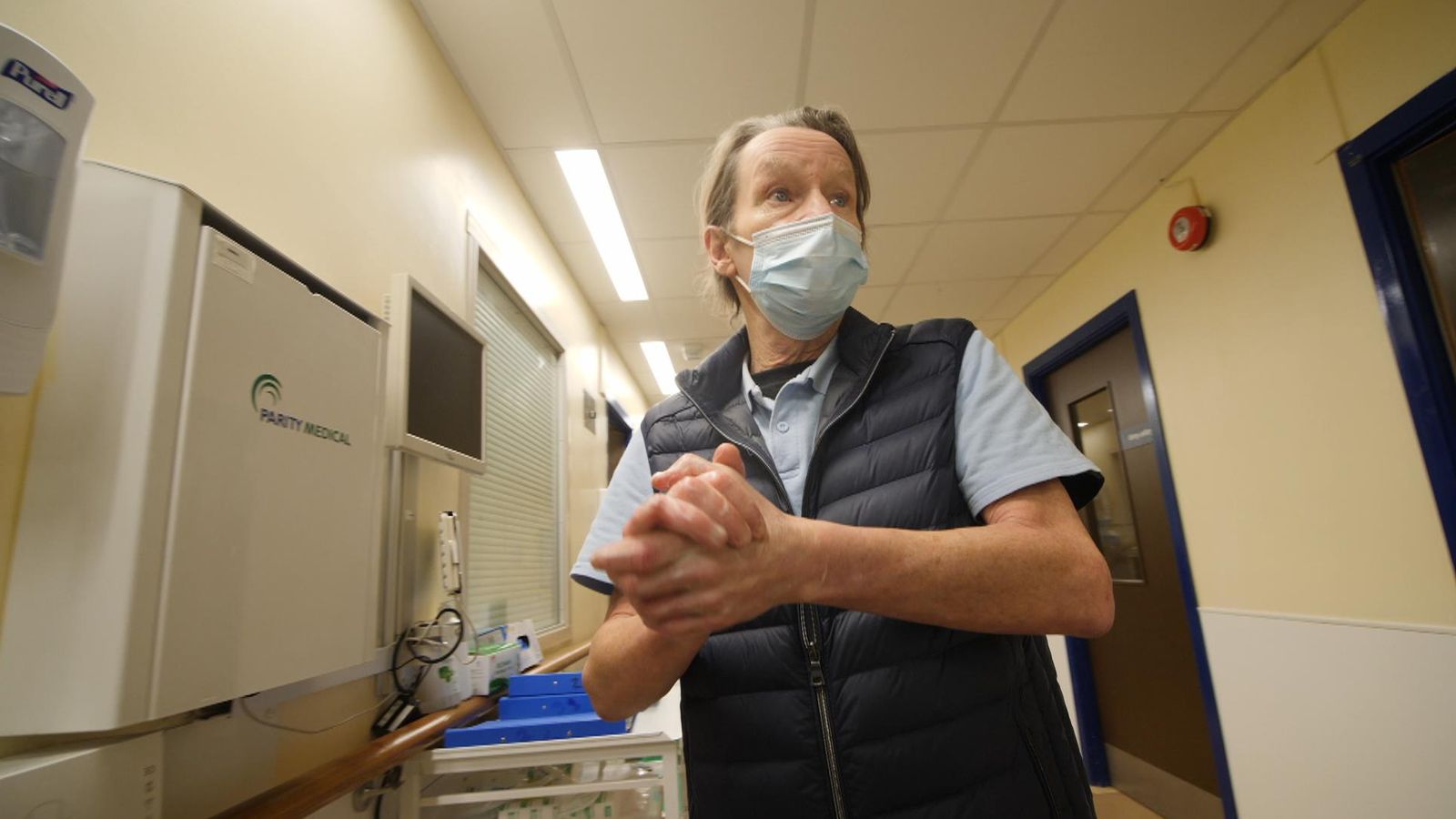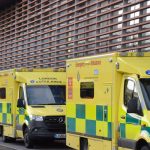“The last few weeks have been basically a whirlwind,” says 59-year-old hospital porter Gerry Foster. “It’s been a living nightmare to work. It’s been the same thing every day.”
In the month that we have been filming at London’s Royal Free Hospital, we would often see Gerry shifting, lifting, bringing in a patient for treatment on the wards.
At times we’d also see him carefully wrapping someone in white cloth – a patient who had succumbed to the virus – transferring them into a blue bag and taking them down to the mortuary.
Quietly, he has gone about his work – a witness to history.
“A little sort of bridge of normality that’s what porters are,” says Gerry. “We’re not giving you drugs. We’re taking you to procedures, talking about the weather, football, whatever, you know, and you do strike up a rapport with patients.”
The porters are often the first to meet patients when they arrive in the emergency department. They will often cross paths with them at various stages throughout the gruelling process of battling COVID-19.
“You can go and collect a patient. Fate may have dictated you’ve taken them before. They say hello Gerry. Or hello Jackie. Hello Matt. And the upside is when they go home.”
“But during this, it’s hard to put into words, but they may not be with us anymore you see.”
Gerry gets emotional as he considers this.
Please use Chrome browser for a more accessible video player
In the month we spent here, 130 patients lost their battle with the illness. On one single day in January, nine patients had to be taken from the wards to the morgue.
It’s a solemn journey to the basement; a warren of narrow corridors where sometimes you pass army personnel who’ve come to help bring in supplies during this extraordinary time.
Gerry says: “When you saw me in the mortuary there would have been names that I knew, and in earlier times I’d have been talking with them about their family, me telling them about mine. And then all of a sudden they’re not there anymore. That’s extremely hard to deal with.”
The entire hospital staff are only now beginning to reflect on what they’ve experienced. It’s by no means over, but a fall in admissions has very slightly relieved the intensity of pressure.
Across the Royal Free Hospital Trust, more than 250 members of staff switched roles to deal with the surge. None will have experienced before the pressures, the severity of illness and the numbers of dead in such a short space of time.
Frequently staff have mentioned the ages of those suffering or dying with the illness. People in their 30s, 40s, and 50s, on a scale they hadn’t seen in the first wave.
When we arrived in mid-January the intensive care unit (ICU) was handling three times its normal capacity and had spread across three storeys of the hospital instead of one. It is still at double capacity across two floors. The vast majority are still COVID patients.
As the hospital attempts to return to normal there’s a backlog of patients needing other procedures. The hospital is going through a continuous process of trying to configure the space so COVID patients are separated from those without the virus.
The Royal Free is one of the country’s leading liver specialist centres – but during the crisis, vital transplant surgery had to be suspended.
Allison Neagle has a genetic condition called polycystic liver disease which has caused her liver to enlarge massively. She’s waited more than 18 months for a transplant.
Arriving in the Royal Free Hospital last week, she told Sky News: “With COVID, and everything else there has been a long delay to my treatment, so I’m hoping today is the day.”
Allison had a successful operation and a space to recover in ICU – but Mike Spiro, liver transplant anaesthetist, said: “The surge in admissions has passed, but we still have a huge number of COVID positive patients in the intensive care unit. COVID patients stay in the intensive care unit for usually a fairly prolonged period.
“So many, many weeks in a lot of cases, so much as the number of admissions has fallen, we still have a lot of COVID patients, we’re still way over 200% of our normal ICU capacity.”
Cardiology is also keen to use the space. Consultant Cardiologist, Carol Whelan, who sometimes acted as a nurse during the peak of the crisis said: “We had a patient who required ICU the other day.
“And in fact, it would have been easier if he’d had COVID because there are beds for him on the COVID ward, but they then had to try and create a bed on the non-COVID ICU, and that’s a real challenge.”
But Carol is concerned that patients with heart problems have been ignoring their symptoms.
She said: “So we have had patients, unfortunately, sit at home with their heart symptoms, when they could have been getting treatment for their heart attack. So we’ve been really trying to encourage patients if they have any cardiac issues to contact us.”
The concern here is that these patients and many others will have stored up health problems, which will make them harder for our NHS to deal with. That is on top of the thousands of surgical procedures that have been delayed.
Caroline Clarke, the group chief executive of the Royal Free NHS Foundation Trust, told Sky News:
“The million-dollar question is how do we decompress – which is the technical term for reduce the number of ICU beds, and how do we give our staff a break and how do we make sure that all those patients who need surgery are going to get it.
“The answer is we are going to need to have a conversation with the public about how long patients are going to have to wait for treatment. This is going to take years, not months to recover from.”
Subscribe to the Daily podcast on Apple Podcasts, Google Podcasts, Spotify, Spreaker






















